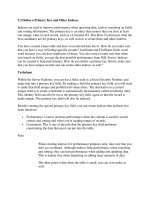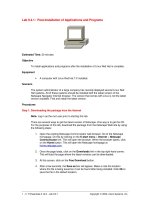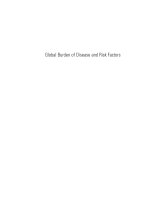Tài liệu Reporting Corrections of Errors and Changes in Accounting Principles - Amending SFFAS No. 7, Accounting for Revenue and Other Financing Sources pdf
Bạn đang xem bản rút gọn của tài liệu. Xem và tải ngay bản đầy đủ của tài liệu tại đây (36.59 KB, 14 trang )
Reporting Corrections of Errors and Changes in Accounting Principles
Amending SFFAS No. 7, Accounting for Revenue
and Other Financing Sources
Statement of Federal Financial Accounting Standards No. 21
October 2001
Federal Accounting Standards Advisory Board
THE FEDERAL ACCOUNTING STANDARDS ADVISORY BOARD
The Federal Accounting Standards Advisory Board (FASAB or “the Board”) was established
by the Secretary of the Treasury, the Director of the Office of Management and Budget
(OMB), and the Comptroller General in October 1990. It is responsible for promulgating
accounting standards for the United States Government.
An accounting standard is typically formulated initially as a proposal after considering the
financial and budgetary information needs of citizens (including the news media, state and
local legislators, analysts from private firms, academe, and elsewhere), Congress, Federal
executives, Federal program managers, and other users of Federal financial information. The
proposed standard is published in an Exposure Draft for public comment. A public hearing is
sometimes held to receive oral comments in addition to written comments. The Board
considers comments and decides whether to adopt the proposed standard with or without
modification. The Board publishes adopted standards in a Statement of Federal Financial
Accounting Standards.
Additional background information is available from the FASAB:
• “Memorandum of Understanding among the General Accounting Office, the
Department of the Treasury, and the Office of Management and Budget, on Federal
Government Accounting Standards and a Federal Accounting Standards Advisory
Board,” Amended October 1, 1999.
• “Mission Statement: Federal Accounting Standards Advisory Board”
Federal Accounting Standards Advisory Board
441 G Street, NW, Suite 6814
Mailstop 6K17V
Washington, DC 20548
Telephone (202) 512-7350
Fax (202) 512-7366
www.financenet.gov/fasab.htm
EXECUTIVE SUMMARY 1
Federal Accounting Standards Advisory Board
Reporting Corrections of Errors and Changes in Accounting Principle
October 2001
EXECUTIVE SUMMARY
I. This Statement amends the standard on Prior Period Adjustments contained
in Statement of Federal Financial Accounting Standards No. 7, Accounting for
Revenue and Other Financing Sources (SFFAS No. 7), which was issued in
April 1996.
II. Paragraph 76 of SFFAS No. 7, entitled Prior Period Adjustments, addresses
accounting changes and errors that affect prior period financial statements. It
does not permit reporting entities, when presenting prior period financial
statements for comparative purposes, to restate prior period financial
statements to show the effect of the accounting errors.
III. The unforeseen result is that reporting entities that have material errors in
their prior period financial statements are unable to present them for
comparative purposes without creating both a dilemma for auditors and
confusion for users. The dilemma for the auditors is that they would have to
qualify their opinion on the prior period financial statements whether or not
they had been restated. If prior period statements were presented that
contained a material error, auditors would have to qualify their opinion. On
the other hand, if prior period statements were presented and balances had
been corrected for an error, auditors would still have to qualify their opinion
because such restatement would not be in accordance with the existing
standard. The confusion for the user derives from the difficulty inherent in
comparing the financial statements for two or more periods when the effect of
the error is not shown in the prior periods’ financial statements.
IV. To correct this situation, the amendment requires that when material errors
are discovered in prior period financial statements, all statements presented
must be restated to correct the error.
V. The Board has retained the current requirement that prior period financial
statements not be restated for changes in accounting principles, unless
otherwise specified in the transition instructions section of a new FASAB
EXECUTIVE SUMMARY 2
Federal Accounting Standards Advisory Board
Reporting Corrections of Errors and Changes in Accounting Principle
October 2001
standard. The language addressing the requirements, however, has been
revised to improve clarity and to require certain disclosures.
TABLE OF CONTENTS 3
Federal Accounting Standards Advisory Board
Reporting Corrections of Errors and Changes in Accounting Principle
October 2001
TABLE OF CONTENTS
EXECUTIVE SUMMARY…………………………………………………………………………………… 1
INTRODUCTION…………………………………………………………………………………… ……….4
ACCOUNTING STANDARD…………………………………………………………… ………………… 6
APPENDIX A: BASIS FOR CONCLUSIONS………………………………………….….………… … 8
INTRODUCTION 4
Federal Accounting Standards Advisory Board
Reporting Corrections of Errors and Changes in Accounting Principle
October 2001
INTRODUCTION
1. Statement of Federal Financial Accounting Standards No. 7, Accounting for
Revenue and Other Financing Sources, became effective for fiscal year
1998. It includes a section describing how reporting entities should handle
prior period adjustments.
2. The Section on Prior Period Adjustments states:
76. Prior period adjustments should be limited to corrections
of errors and accounting changes with retroactive effect,
including those occasioned by the adoption of new federal
financial accounting standards, and should be recognized
and measured under applicable standards. Adjustments
should be recognized as a change in cumulative results of
operations (rather than as an element of net results of
operations for the period). Prior period financial statements
should not be restated for prior period adjustments
recognized in the current period.
3. When SFFAS No. 7 was issued, the Board believed that having reporting
entities restate prior period financial statements for prior period adjustments
would create an unnecessary burden at a time when FASAB was still
establishing a basic framework of standards.
4. However, disallowing restatement of prior period financial statements has had
the effect of preventing reporting entities from presenting comparative
financial statements when the prior period financial statements contain a
material error that is discovered in the current period.
5. The Board has amended the standard to require that reporting entities restate
prior period financial statements for material errors discovered in the current
period, if such statements are provided for comparative purposes, and if the
effect of the error would be material to the financial statements in either
period.
INTRODUCTION 5
Federal Accounting Standards Advisory Board
Reporting Corrections of Errors and Changes in Accounting Principle
October 2001
6. The Board has chosen to retain the current methodology that prior period
financial statements not be restated for changes in accounting principles,
unless otherwise specified in the transition instructions section of a new
FASAB standard. The language addressing the requirements, however, has
been revised to improve clarity and to require certain disclosures.
7. The language in the standard has also been revised to distinguish between
corrections of errors and changes in accounting principles. A change in
accounting principle should be identified as such and no longer reported as a
prior period adjustment.
Effective Date
8. This amendment would be effective for periods beginning after September 30,
2001, with earlier implementation encouraged.
ACCOUNTING STANDARD 6
Federal Accounting Standards Advisory Board
Reporting Corrections of Errors and Changes in Accounting Principle
October 2001
ACCOUNTING STANDARD
9. Paragraph 76 of SFFAS No. 7, Accounting for Revenue and Other Financing
Sources, Section Prior Period Adjustments, is superceded and replaced by
Paragraphs 10 through 14 below.
Corrections of Errors
10. “Errors in financial statements result from mathematical mistakes, mistakes in
the application of accounting principles, or oversight or misuse of facts that
existed at the time the financial statements were prepared.”
1
When errors
are discovered after the issuance of financial statements, and if the financial
statements would be materially misstated absent correction of the errors,
corrections should be made as follows:
(a) If only the current period statements are presented, then the
cumulative effect of correcting the error should be reported as a prior
period adjustment. The adjustment should be made to the beginning
balance of cumulative results of operations, in the statement of
changes in net position.
(b) If comparative financial statements are presented, then the error
should be corrected in the earliest affected period presented by
correcting any individual amounts on the financial statements. If the
earliest period presented is not the period in which the error occurred
and the cumulative effect is attributable to prior periods, then the
cumulative effect should be reported as a prior period adjustment.
The adjustment should be made to the beginning balance of
cumulative results of operations, in the statement of changes in net
position for the earliest period presented.
(c) The nature of an error in previously issued financial statements and
the effect of its correction on relevant balances should be disclosed.
1
Accounting Principles Board Opinion No. 20, par. 13.
ACCOUNTING STANDARD 7
Federal Accounting Standards Advisory Board
Reporting Corrections of Errors and Changes in Accounting Principle
October 2001
Financial statements of subsequent periods need not repeat the
disclosures.
11. Prior period financial statements should only be restated for corrections of
errors that would have caused any statements presented to be materially
misstated.
Changes in Accounting Principles
12. A change in accounting principle is a change from one generally accepted
accounting principle to another one that can be justified as preferable. For
the purposes of this standard, changes in accounting principles also include
those occasioned by the adoption of new federal financial accounting
standards.
13. Unless otherwise specified in the transition instructions section of a new
FASAB standard, for all changes in accounting principles that would have
resulted in a change to prior period financial statements:
(a) The cumulative effect of the change on prior periods should be
reported as a “change in accounting principle.” The adjustment
should be made to the beginning balance of cumulative results of
operations in the statement of changes in net position for the period
that the change is made.
(b) Prior period financial statements presented for comparative purposes
should be presented as previously reported; and
(c) The nature of the changes in accounting principle and its effect on
relevant balances should be disclosed in the current period. Financial
statements of subsequent periods need not repeat the disclosure.
The provisions of this statement need not
be applied to immaterial items.
APPENDIX A: BASIS FOR CONCLUSIONS 8
Federal Accounting Standards Advisory Board
Reporting Corrections of Errors and Changes in Accounting Principle
October 2001
APPENDIX A: BASIS FOR CONCLUSIONS
14. This appendix summarizes some of the considerations deemed significant by
the Board in reaching the conclusions in this Statement. It includes the
reasons for accepting certain approaches and rejecting others. Individual
members gave greater weight to some factors than to others.
15. The Board received sixteen responses to the ED. All but one respondent
were in support of the amendment. The Board did not rely on the number in
favor of or opposed to a given position. Information about the respondent’s
majority view is provided only as a means of summarizing the comments.
The Board considered the arguments in each response and weighed the
merits of the points raised. The respondent’s comments are summarized
below.
Federal Non-federal
Users, academics, others 2
Auditors 2
Preparers and financial
managers
12
16. Seven respondents approved the amendment without further comment. Four
approved the amendment but requested clarifying language, which has been
incorporated into the standard. Two approved the amendment but would
have preferred that the standard allow restatement for changes in accounting
principles.
17. One respondent disapproved of the amendment because they believe the
amendment will create additional confusion regarding the closing of prior
period accounts and the subsequent issuance of financial statements.
APPENDIX A: BASIS FOR CONCLUSIONS 9
Federal Accounting Standards Advisory Board
Reporting Corrections of Errors and Changes in Accounting Principle
October 2001
Corrections of Errors
18. When SFFAS No. 7 was issued, the Board believed that having reporting
entities restate prior period financial statements for prior period adjustments
would create an unnecessary burden at a time when FASAB was still
establishing a basic framework of standards. Changes in the federal
accounting environment in the ensuing years have lessened these concerns.
With the government’s increasing ability to produce accurate and
sophisticated financial statements, the Board is more concerned with
encouraging reporting entities to produce financial statements that are most
useful to managers and other users.
19. Although comparative financial statements are not required by any of the
accounting standards setting boards, it is generally held that “the presentation
of comparative financial statements in annual and other reports enhances the
usefulness of such reports and brings out more clearly the nature and trends
of current changes affecting the enterprise.”
2
20. Reporting entities also recognize that presenting comparative statements
greatly enhances the overall usefulness of financial statements. Despite the
advantages of providing comparative statements, however, at least one
governmental entity has been constrained from presenting its prior year
statements because they contain a material error.
21. The Board has deliberated on the effects of the existing standard precluding
restatement to correct errors on presentation of comparative financial
statements. Although it believes that the considerations in effect at the time
the existing standard was issued were valid, it has concluded that potentially
losing or delaying the benefit of comparative statements now outweighs these
considerations.
22. The Board concluded that the standard for Prior Period Adjustments should
be amended to specifically require that prior period financial statements
presented for comparative purposes be restated to correct material errors,
and that restatement should be limited to only material errors.
2
Accounting Research Bulletin 43, Chapter 2A, paragraph 101.
APPENDIX A: BASIS FOR CONCLUSIONS 10
Federal Accounting Standards Advisory Board
Reporting Corrections of Errors and Changes in Accounting Principle
October 2001
Changes in Accounting Principles
23. Although the Board has chosen to retain the current methodology for
reporting changes in accounting principle, it has revised the language to
improve clarity and to require certain disclosures. The Board may consider
exceptions to this decision, if warranted, for accounting standards issued in
the future. It may also further examine issues raised by respondents
regarding changes in accounting principles.
Other Accounting Changes
24. Although accounting estimates and changes in reporting entity are identified
as accounting changes in other accounting literature, the Board did not
address these issues because they require further study and were not
addressed in paragraph 76 of SFFAS No. 7.
Board Approval
25. This statement was approved by unanimous vote of the Board.
FASAB Board Members
David Mosso, Chairman
Barry B. Anderson
Philip T. Calder
John A. Farrell
Joseph L. Kull
James M. Patton
Robert N. Reid
Nelson E. Toye
Kenneth J. Winter
FASAB Staff
Wendy M. Comes, Executive Director
Project Staff:
Andrea Palmer
Federal Accounting Standards Advisory Board
441 G Street NW
Suite 6814
Mailstop 6K17V
Washington, DC 20548
Telephone (202) 512-7350
FAX (202) 512-7366
FASAB
FASAB
Federal Accounting Standards Advisory Board
U.S. General Accounting Office
441 G Street, NW, Suite 6814 (6K17V)
Washington, DC 20548
Official Business
Penalty for Private Use $300
Presorted Standard
Postage & Fees Paid
GAO
Permit No. G100









